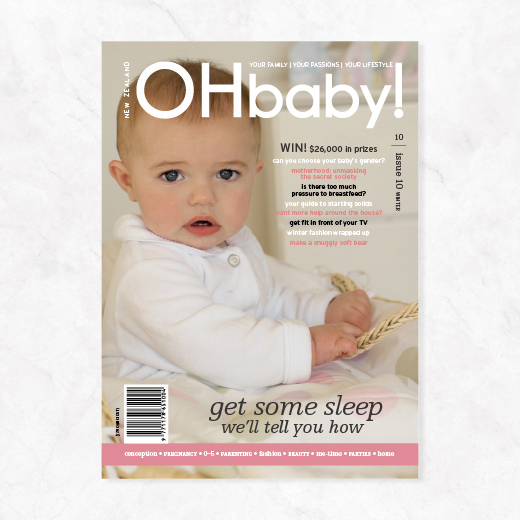Motherhood - the secret society

You've read the books, bought the recommended equipment, welcomed your passionately anticipated bundle of joy into the world… But did anyone tell you what being a mum was really going to be like? Welcome to the secret society of motherhood, says midwife Paula Brasovan.
I read a text on motherhood recently that summarised a piece of research with, "The feeling of being buried alive is now a commonplace experience of motherhood." This line stopped me in my tracks, and I've been mulling it over ever since.
Supporting women is why I chose to become a midwife. Over the years, I have observed my antenatal practice becoming more and more oriented around trying to open a dialogue about motherhood rather than being solely focused on pregnancy: In no way to diminish the experience of pregnancy, but rather to try to assist other women in breaking down the veil of silence that surrounds what I have called "the secret society." My postnatal care increasingly deals with the shock, elation, exhaustion, confusion, depression, panic, and utmost inability to "measure up" to the expectations that our peers, our society, and we ourselves place upon this most important way of life.
I entered midwifery childless and, in my final year, fell pregnant with what my friends and I giggled would be my "practical" study of the subject. What I discovered with my "research" was something that has taken me five years (and two children) to verbalise. After the birth of my children, I found that I had inadvertently become a member of the secret society of motherhood. I had never stopped to think about the role of motherhood - the rite of passage when you become someone other than who you had always previously been. I had no idea what the membership entailed until after I had joined. I discovered that while deeply loving my children and being their mother, I was repeatedly confronted with feelings of discontent and a "loss of self". I spent years feeling like I was a total failure because of the guilt of actually "not liking it" quite often, despite the absolute devotion and love I also had. I didn't know that this was normal. I thought I just couldn't cut the mustard, so to speak. Therein lies the secret - and the silence (for me, now broken).
Mothers can find themselves entangled in an on-going dance of ambivalence, highs and lows, fierce indescribable love in times, and an overwhelming urge to flee to the hills in others. Motherhood is embroiled with both fulfiIlment and a longing to be other than what you have become. I, like many mothers I meet, felt I had to be the "perfect" mother. I approached motherhood like my work, with an "academic mind" as if it was a series of problems that needed to be solved, and that somehow it would fit into all the contemporary values that stress achievement, success, control, high performance culture, and autonomy. It just so happens that motherhood is utterly subversive to having any of these values as one's highest of aspirations.
As a midwife, I'm used to walking into homes and seeing the baffled, panic-stricken look in the eyes of new mothers - the look that explicitly reveals, "This is NOT what I signed up for!" I usually say gently, "Welcome to the secret society of motherhood." Some would be brave enough to reveal the extent of her distress by wanting to continue the dialogue and ask me, "Why is it like this?" But most of us will turn our turmoil about motherhood into an "it could always be worse" type of scenario, or say something like, "Oh, but it's so rewarding!", or mention a positive as if this will negate the negative. And really, what this does is mimic society's response to these feelings and devalues the truth in our experience, breeding resentment, guilt, and a sense of failure.
 And then, even worse, we turn on each other, in the hopes of finding an anchor by making comparisons with others. I could never before comprehend how it was that some mothers managed to walk around in nice clothes, having put on make-up and done their hair. I used to tell myself that their children obviously couldn't possibly be as happy as mine because they surely wouldn't have been able to manage their own appearance and find the time to play with their kids "like I do". It dawned on me, however, some four years later, that those women were far cleverer than me, and managed to find refuge in the only place in their home with a lock on it - the bathroom.
And then, even worse, we turn on each other, in the hopes of finding an anchor by making comparisons with others. I could never before comprehend how it was that some mothers managed to walk around in nice clothes, having put on make-up and done their hair. I used to tell myself that their children obviously couldn't possibly be as happy as mine because they surely wouldn't have been able to manage their own appearance and find the time to play with their kids "like I do". It dawned on me, however, some four years later, that those women were far cleverer than me, and managed to find refuge in the only place in their home with a lock on it - the bathroom.
Society does not allow any space for the innate struggles of motherhood, and prefers to marginalise women's experience with labels such as "the baby blues" and "post natal depression". The idea that we are sold is this: Get all the gear, read all the books, give birth, establish a routine, and then get back to normal (your "old" self). When this unobtainable ideal doesn't happen, women who mother therefore fail to qualify as "normal" in society. I recall a nurse saying to me, in a lecture where we were discussing a scenario of a woman struggling with breastfeeding and motherhood, "But if you tell women it's hard, then you make it hard!" She adamantly believed that acknowledging the difficulties so many women face would somehow make it harder. I was baffled by her logic and could only initially reply, "But it is hard." If women say motherhood is hard, but only in secret to one another, only after we become mothers, and not to our sisters who come after us, and only in feminist texts, then what does this serve? If someone says out loud that this is hard and we rebuke the comment with some "stiff upper lip" mentality, then we're not listening. What happens to that expression of a feeling, of a situation, that goes unacknowledged? The secret society has to be made public! After all, motherhood is at the very core of humanity.
Indeed, the ambivalence of motherhood is a subject that has been studied for decades now. Rozsika Parker, Susan Maushart, Ann Oakely, and Rima Apple, to name but a few, have devoted much of their lives to examining this intensely common and equally silent development of the maternal psyche. What their research reveals is that the estimation of the demands of motherhood is unbelievably ill-informed and that the expectation of seamlessly blending motherhood, relationships, and career into a self-actualised whole will often fail miserably. In one study I examined, the majority of women with young families said they preferred to do no paid work at all, but the reality is that a vast amount of women with young children do paid work despite the fact that "the bulk of the chores have not shifted away from women." The daily stress then becomes a chronic-fatigue lifestyle. In another it stated that women are increasingly looking to work as an escape from home, and that paid work is considered by a lot of women as a form of "recreation." Recreation? What happened to reading a book on the beach with a cocktail? Has the function of our families become predicated on the dismembering of women themselves when they see more work as their way of getting some time to enjoy themselves?
Where motherhood used to be an unavoidable part of the fabric of daily social life, we now have to seek "training" and "expert" advice in caring for our children. But "mothering from a book" can exacerbate the anxiety and guilt, because you don't learn to trust yourself. Before my first child was born, I read a book that talked about the merits of a child essentially being continuously held until crawling. I tried to stick to this so rigorously, because it stated that this was what made children healthier, happier and secure, that I didn't even succumb to buying a stroller until she was over 10 months old. The book failed to mention the cost of such an endeavour when you don't live in a long house with a tribe of mothers all sharing childcare, feeding, domestics, and work! Perhaps (if) these children were happier and more secure, it was because there was a "collective responsibility" to raising children, shared and embraced by the whole community.
Books imply that motherhood is some kind of learnable sequence of events: That infant/child behaviour is (or can be, if "managed properly") malleable and predictable. What really matters is practical experience with babies and children; support from partners, family, society, and friends; acceptance that children have personalities that make them genetically/spiritually predisposed to relatively settled behaviours; and realising that becoming a mother is a process. It happens slowly, in small increments and degrees, with accumulated experience, observation, wisdom, and confidence.
Listening to the broken silence
It is true that the "inner conviction that the hard and often lonely work of mothering is an infinitely worthwhile endeavour" never wavered for me. I imagine this to be true also for the vast majority of mothers. The fulfillment and intense joy that children bring is beyond all words to describe, and if I knew then what I know now, I would absolutely still choose my life. One laugh out of my children's mouths cradles the entirety of my soul.
In my personal experience of motherhood, my biggest struggles to date have been not with my children, but from being positioned to have to also be the breadwinner, have a career, still be fit and look good, have a social life, find time for myself, friends and family, have a relationship with my partner, continuously study for my profession, do hobbies and have interests "outside of home and work", and be happy with this load and not grumble about it very much. Mothering small children (and perhaps stretching it to include part-time work) would be more than enough for me. What really saddens me is that women and society seem to have a sense of hubris attached to just how much we can take on and do - like "full-time" mothers are taking the easy road or somehow "opting-out", completely misrepresenting and devaluing the role.
I envy my mother's generation. She was able to stay home with my sister and me until we were in school full-time. She didn't have to concentrate on anything more than being our great mum for those years, and so I imagine that somehow she didn't have to juggle quite so many balls so tenuously in the air. I don't know though if this is entirely true, as she never really said - perhaps her silence in fact reinforces that for each generation of mothers, ambivalence is present. I do know that my own mother does not report feeling a "loss of herself" to the degree to which I have, and she does often say that "mothers of today are taking on too much". I happen to agree. Diminishing your own needs for the sake of your family means you are living a lie, no matter how greatly intended your motives are. But perhaps we, as mothers need to actually include ourselves in our definition of "our family needs." After all, aren't we part of the family?
I know full-time motherhood isn't for everyone and I hope readers will not find any judgement in my preferred longing to be a full-time mother. I fully appreciate the love of one's work (I do love being a midwife), or the need to hide (I am one of those mothers who sees work as a break at times, too). Motherhood is a full time role that seems to be on top of a lot of other full time roles for women. I hope that the next generation of mothers continues to break the silence and take the women's movement one step beyond having it all, being it all, doing it all - to being authentically ourselves, and admitting our limitations. Maushart writes: "We will never attain the goal of living comfortably in our choices as mothers until we acknowledge that we have choices and even more importantly that we deserve to have them." Feeling buried alive is not how anyone should be feeling, least of all the mothers of us all.
Paula Brasovan is a registered midwife and the busy mother of two young children. She lives in Auckland.
References
* Apple, R. Perfect Motherhood. 2006: Rutgers University Press, USA.
* Bittman, M (1991). "Juggling Time: How Australian families use time. Prepared for the office of the status of women." 1991: Dept. of the Prime Minister and Cabinet, Canberra, Australia
* Brannen, J and Moss, P. Managing Mothers: Dual Earner Households after Maternity Leave. 1990: Unvin Hyman, UK.
* Hochschild, A. The time Bind: When Work Becomes Home and Home Becomes Work. 1991: Holt and Company, USA
* Hochschild, A and Machung, A. The Second Shift: Working Parents and The Revolution At Home. 1989: Penguin, USA
* Maushart, S. The Mask of Motherhood. 2000: Penguin, USA
* Oakley, A. Social Support and Motherhood. 1992: Oxford and Cambridge Press, UK
* Parker, R. Torn in Two: The Experience of Maternal Ambivalence. 2005: Virago Press, UK
* Rothman, B. Recreating Motherhood: Ideology and Technology in a Patriarchal Society. 1990: WW Norton, USA

AS FEATURED IN ISSUE 10 OF OHbaby! MAGAZINE. CHECK OUT OTHER ARTICLES IN THIS ISSUE BELOW

















